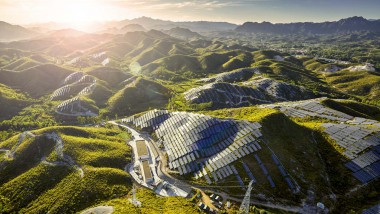Turning the Tide on the Conservation of Our Oceans
The deterioration of the world’s oceans is becoming a global debate. In a Q&A, Simon Dent and David Barley of Mirova Natural Capital, an affiliate of Natixis Investment Managers, explain how investors can help improve sea health and create marine-focused jobs, while earning market-based investment returns.
Key Takeaways:
- Marine resources are worth around $3 trillion, yet the damage to oceans is nearing a tipping point.
- Investing in the oceans requires strategies around sustainable fishing, saving endangered species and marine tourism, plastic waste management and coastal conservation.
- Positive environmental outcomes and attractive market-based returns are not mutually exclusive – projects must demonstrate financial returns and quantitative environmental gains.
- For institutional investors with a long-term horizon, sustainable ocean strategies are designed to produce returns in line with private equity-style strategies focused on growth businesses.
A. The health of oceans receives very little attention. This is odd as oceans cover around three-quarters of our planet and hold 97% of all Earth’s water. Oceans are crucial to our weather patterns, since they process more than half of the oxygen that we breathe and absorb roughly a quarter of our CO2 emissions.
Oceans are critical to livelihoods. Marine resources are worth around $3 trillion and 350 million jobs are directly linked to ocean activities worldwide. Fisheries are disproportionately important to the developing world with 90% of those deriving their livelihoods from fishing living in emerging countries. Then there is tourism: marine tourism accounts for 9.8% of global GDP and employs 277 million.
So you can see why it is puzzling that more attention is not paid to the sustainability of oceans.
Q. What is going wrong with oceans?
A. The current focus on plastic pollution is just the tip of the iceberg (no pun intended); ocean assets are being degraded everywhere. Some 90% of the world’s fisheries are now fully fished or overfished. More than half of all coral reefs are dead or dying, damaged by climate change-related temperature rises and pollution from intensive farming and urban sewers. And yes, plastic – most of which comes from onshore activities – is clogging the ocean, endangering some marine species.
In our view, the damage to oceans is nearing a tipping point. Unfortunately, very little is being done to address this. Unlike on land, where there are many national parks, the concept barely exists at sea. The oceans seem to be a very undervalued asset compared to conservation efforts around forests and other terrestrial natural capital.
Q. Is it too late to restore the health of the world’s oceans?
A. Absolutely not. Most academic studies show that basic marine husbandry can achieve relatively quick results. Given sustainable practices, lobster, for instance, can show significant recovery in stocks within 24 months. Replenishing larger migratory species such as tuna stocks can take much longer, between five and 10 years. But the point is that a bounce back is possible.
Our investment strategy aims to enhance sustainability in three key areas:
- Sustainable Seafood - Investment into capital and technical resources to increase best practice aquaculture and wild-caught seafood businesses that can be certified sustainable and access high-value markets globally. Investments can be made into seafood production and in the supply chain to increase efficiency and sustainability, from input to point of sale.
- Circular Economy - Investment into key coastal infrastructure and business projects to unlock the value from waste and pollution and upcycle products so that they don’t damage the ocean. The strategy is particularly focussed on plastics and wastewater management.
- Ocean Conservation - Investment into coastal protection & management to improve biodiversity and resilience in coastal communities, creating business opportunities through tourism, payments for ecosystem services and Blue-Economy infrastructure.
A. The strategy is structured in a similar way to a private equity growth fund. We invest in enterprises involved in the three key areas above, improving their sustainability and efficiency. For instance, artisanal fisheries in emerging markets often struggle to change their processes. By reducing the wastage between landing and processing, or by improving storage facilities, or by upgrading management skills, unsustainable and unprofitable business can be transformed. Fishing volumes can be sustainably restored and profits can actually be increased.
We use technology to create further value, for instance by micro chipping the supply chain boxes for lobsters so the restaurant that buys the end product knows exactly where the lobster was caught, where and by whom. In that way, a premium product, which matches the expectations of upscale restaurateurs and their customers, is created. With seafood demand expected to grow by 50% by 2030, and the sustainable seafood market enjoying double-digit growth over the last five years, the opportunity is sizeable and scalable.
Q. So is ocean sustainability all about better fishing?
A. Fishing is just one facet of a sustainable ocean strategy. Our project pipeline is spread across emerging markets in Latin America, Asia, the Indian Ocean and Africa. Our other projects range from saving endangered species, to marine tourism, to plastic waste management and coastal conservation.
A non-fishery example is a coral reef conservation project in the Dominican Republic. A stretched government budget and indebtedness in this relatively poor country led to a lack of funding and capacity for crucial conservation. Mirova Natural Capital will invest up to $3 million to create a marine reserve managed by a private-public operator. The reserve derives revenues by charging tourists an entry fee and levying further fees for diving down to the reef.
With 85,000 visitors a year to the reserve, local businesses and employment should be sustained over the long term, the reef will be protected and key reef species are expected to bounce back. And investors should receive returns in line with expectations from similar private equity or infrastructure investments.
Q. This sounds like a pretty innovative strategy. Can it actually work?
A. The strategy is possibly unique. There are many reasons why we are convinced it will have a positive impact on marine capital and deliver expected returns to investors.
First, it has solid backing: it launched in mid-2018 with a cornerstone investment from the European Investment Bank, and further support from FMO and the Inter-American Development Bank. There is also a range of blue-chip private investors including Axa Investment Managers, CapRock Wealth Advisors and The Packard Foundation.
Second, the strategy has a USAID Development Credit Authority guarantee, which means if any individual project goes into default, investors will benefit from the USA guarantee and the strategy will be able to recover up to 50% of the principal. This also leads to a good access to USAID’s pipeline of marine sustainability projects.
Third, Mirova has a long history of successfully managing sustainability projects, including a similar terrestrial strategy based on land degradation neutrality, so we can apply skills and experience from existing investment strategies to this new one.
Fourth, it has a global team, with local presence sometimes sourced through partnerships with technical experts on the ground. This enables us to transfer structural and investment skills to underinvested opportunities anywhere in the world with a coherent investment philosophy and strategy. In short, we can take what we have done with one project and scale it up around the world in a series of similar projects.
Q. Are returns comparable with mainstream assets?
A. Our key impact objectives include:
- Financing the sustainable management of over 175,000 ha of marine areas
- Significantly improving the stock status of more than 20 fisheries and ecosystems.
- Protecting at least 17,500 ha of mangroves from deforestation and degradation
- Creating or supporting more than 5,500 jobs in underserved coastal communities.
- Indirectly supporting a further 14,000 jobs in associated supply chains.
- Creating or supporting more than 15 enterprises and leaving them in a viable state and under local ownership.
- We have a formal ESG framework in which we look at the impacts of our strategy and report back annually to investors across thematic areas.
A. This strategy is for investors who have taken the conscious decision to invest in impact and natural capital. Their investment mandate often specifies this. Since the strategy is structured with a lifecycle of 8-10 years, investors need to have a long-term horizon and a tolerance for illiquidity.
The strategy is likely to sit within the alternative or private equity allocation, and is designed to produce returns in line with other private equity strategies focused on growth businesses. While family offices, high net worth individual and foundations have all been early investors, the strategy is attracting the attention of pension funds and insurers too.
Published in November 2018
Mirova Natural Capital Limited
UK Private Limited Company
Company registration number: 07740692
Regulated by FCA
Registered office: 12 Gough Square London EC4A 3DW
www.althelia.com
MIROVA
Affiliate of Natixis Investment Managers
Mirova is a subsidiary of Natixis Investment Managers International.
French Public Limited liability company with board of Directors.
Share Capital: €8 322 490
Regulated by the Autorité des Marchés Financiers (AMF) under n° GP 02014.
RCS Paris n° 394 648 216
59 avenue Pierre Mendès France
www.mirova.com
Natixis Investment Managers International
French Public Limited liability company with board of Directors (Société Anonyme)
Share capital : €51 371 060,28
RCS Paris : 329 450 738
Regulated by the Autorité des Marchés Financiers (AMF) under no. GP 90-009.
43 avenue Pierre Mendès France
75013 Paris
www.im.natixis.com
Natixis Investment Managers
RCS Paris 453 952 681
Share Capital: €178 251 690
43 avenue Pierre Mendès France
75013 Paris
www.im.natixis.com
This communication is for information only and is intended for investment service providers or other Professional Clients. The analyses and opinions referenced herein represent the subjective views of the author as referenced unless stated otherwise and are subject to change. There can be no assurance that developments will transpire as may be forecasted in this material.
Copyright © 2018 Natixis Investment Managers S.A – All rights reserved





 Impact Report 2018
Impact Report 2018
